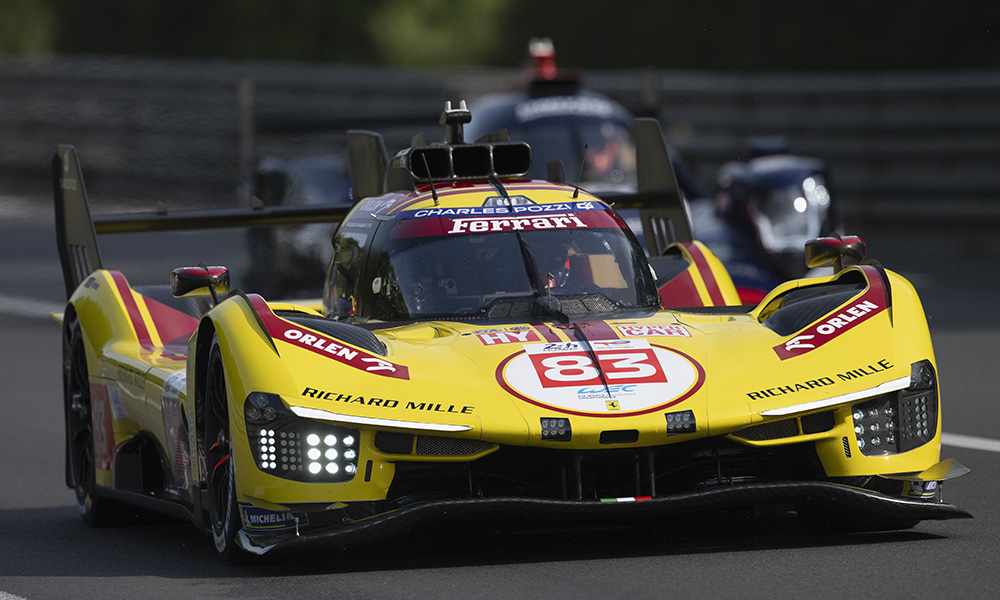Robert Kubica has tempered expectations relating to the efficiency of the Ferrari 499P after the 24 Hours of Le Mans check day held final Sunday, expressing considerations in regards to the automobile’s “raceability” as a result of its comparatively low energy output above 250 km/h in comparison with different Hypercars.
The skilled Polish driver, who beforehand competed in Components 1, set the quickest time in the course of the morning session of the check day and adopted with the third-fastest lap within the afternoon. Regardless of his robust efficiency, Kubica completed 0.656 seconds behind the quickest benchmark set by Toyota’s Brendon Hartley.
Ferrari’s prime contender on the check was the manufacturing unit No. 51 automobile, pushed by James Calado, who clocked the second-best time within the afternoon session, trailing the No. 8 Toyota by 0.531 seconds.
Traditionally, the Ferrari 499P has been famous for its straight-line velocity, contributing to victories within the final two editions of the Le Mans 24 Hours. Nevertheless, this 12 months’s Stability of Efficiency (BoP) changes have launched a broader unfold of Energy Achieve values throughout all Hypercars.
Whereas Ferrari improved energy output underneath 250 km/h in comparison with final 12 months, the 499P now registers the bottom energy determine above this threshold, producing 500.1 kW, roughly 20 kW lower than probably the most highly effective Hypercar, the BMW M Hybrid V8.
Kubica acknowledged the intentions of the rule-makers to equalize prime speeds however admitted that Ferrari’s relative lack of energy over 250 km/h may current difficulties throughout race situations. He identified that pure prime velocity numbers don’t inform the complete story, as the best way the automobile reaches that velocity considerably impacts efficiency.
He defined that though some vehicles have larger drag, they’ll attain their prime velocity faster, the place uncooked energy is crucial, however effectivity additionally performs an important position. Kubica famous that Ferrari is the weakest in energy above 250 km/h, which can not favor them in racing, though the ACO goals to take care of aggressive parity.
Robert Kubica additionally highlighted the significance of discovering the appropriate stability between energy and effectivity to optimize the automobile’s efficiency, emphasizing that equality amongst opponents won’t ever be precise.
Relating to his tempo in the course of the check day, the Polish racing driver expressed satisfaction with the habits of the No. 83 Ferrari however talked about that the cool and overcast climate situations throughout testing may not replicate what can be skilled throughout race week.
The AF Corse driver advised that whereas the automobile felt good underneath these situations, translating that into race efficiency stays unsure. Robert Kubica famous that rising temperatures may considerably influence the automobile, notably with rear tire degradation, based mostly on final 12 months’s expertise.
Nonetheless, he acknowledged that Ferrari has improved the automobile and gained a greater understanding of its habits, making it an attention-grabbing problem to see how the 499P will carry out underneath hotter situations.
When requested in regards to the competitors heading into the official follow classes, Robert Kubica predicted that LMDh producers similar to BMW, Cadillac, Alpine, and Porsche would pose a better problem than final 12 months’s extra simple duel between Ferrari and Toyota. He noticed that the competitors seems tighter this season, with at the very least 5 or 6 producers more likely to be very aggressive, particularly in shorter stints.
Robert Kubica defined that efficiency will fluctuate over the 24-hour race relying on situations and race phases. He famous that the LMDh vehicles have made important progress since final 12 months, with BMW notably enhancing its consistency over a full race distance.
The AF Corse driver additionally expects Cadillac to be aggressive, citing their robust exhibiting in Qatar, together with Alpine, which he considers to have excessive potential, and naturally, Porsche, rounding out a powerful discipline of at the very least six producers more likely to contend for podium finishes.




